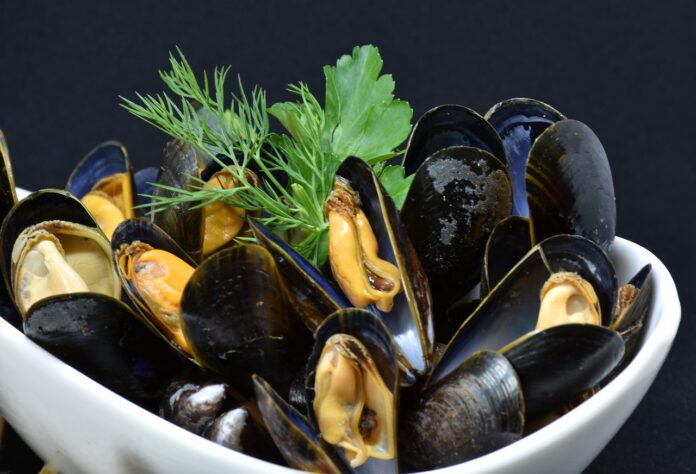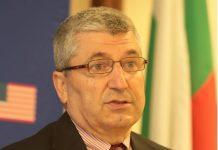
Mussels, a favourite summer food offered on our Black Sea coast, pose serious health risks to humans. The increasing cases of waste found in mussels highlights a serious problem with the quality and safety of this product. The main causes of this problem are poaching, lack of control and marine pollution.
Journalist Diana Fartunova shared on social media her unusual find in mussels she bought. In one of them she found styrofoam. She wrote:
„These are not the teeth of the mussel. I admit, I was startled at first when I opened it. Wow, I said to myself – mutant! It turned out to be styrofoam.“
Fаrtunova urged people not to throw waste into the sea as it comes back to our table. Iskra.bg contacted her about her post. During our conversation, she expressed hope for stricter control of the market:
„I bought the mussels from the Krasnodar market in Burgas. The mussels were very well cleaned, they had no algae. After I boiled them, they opened up and as I started to take the nuts out for the salad, that’s when I saw this styrofoam. I hope there will be stricter control of the market.”
According to unconfirmed information, unscrupulous traders buy cheaper shellfish caught with unclear origin and without certificates. Nikolay Georgiev, owner of a mussel farm in Nessebar, explained how poaching affects the quality of mussels:
„The control of the sale of all types of food for human consumption is carried out in the Regional Directorate for Food Safety -Burgas. If there is styrofoam in the mussel, it is a poached mussel, taken from places where they are not regulated or by trawling. It is completely impossible to get styrofoam from a mussel farm because all the collectors are made of special material.“
In his words, the Bulgarian Food Safety Agency (BFSA) and the Executive Agency for Fisheries and Aquaculture (EAFA) are the institutions that should carry out the necessary control, but at the same time citizens and experts express dissatisfaction with their work. Georgiev stresses that the EAFA controls the habitats designated for cultivation of cultivated mussels and monitors poaching:
„The EAFA is the institution that controls and can limit or stop the poaching of mussels. Anyone who has acquired mussels in a way that is not for cultivation is subject to control in terms of subsequent sale. When a poacher leaves the canal, they are required to run that mussels through a purification center so that they can ensure the mussel is cleaned as it is not from Area A. It is the EAFA that controls and can restrict or stop poaching activities. There are two types of poaching activities related to mussels. The first is carried out by people who do not have any registration with the EAFA, who enter arbitrarily with boats, diving suits and take out mussels, which is absolutely unacceptable. And the others who have registration with the EAFA, they are allowed to take out mussels, but when it is taken out, they are not allowed to sell it in the market, they have to take it to a treatment centre. However, they don’t do that, and that’s why the mussel that’s on the market has all kinds of problems – contamination, Escherichia coli and salmonella, because it’s not from the controlled areas. What’s being sold on the market is already under the control of the BFSA.“
Pollution of the sea with waste, including styrofoam, is also a huge problem, leading to it ending up in mussels.
The Iskra.bg team continues to receive reports from concerned citizens about the insufficient control exercised by the EAFA and the Regional Directorate of Agriculture in Burgas. According to these reports, the lack of oversight is leading to serious issues – poaching and ineffective mussel purification.
Citizens expressed their dissatisfaction with the fact that the competent authorities are not taking sufficient measures to address these problems. They are calling for more serious checks and sanctions to prevent illegal fishing and ensure food safety. However, they say that the problem lies not only in the management of the EAFA but also in the Ministry of Agriculture and Food. According to them, the current Minister Georgi Tahov and his deputy are not fulfilling their duties well enough and the results are visible.
People stressed that the Ministry of Agriculture and its subordinate institutions, particularly the BFSA and the EAFA, should work in the interest of nature and society. They expressed concerns that the current situation leads to harm to the country’s economy and serves the interests of certain businessmen and associations. They pointed out:
„It is unacceptable for the economy and nature to be compromised for private interests. The responsible institutions must fulfill their duties and ensure that the fishing industry and shellfish purification are carried out under strict control, in order to protect both nature and our health. Poaching, insufficient control, and sea pollution are the main causes of these problems. Stricter regulations and greater responsibility from both institutions and traders are needed to ensure product safety.“
Iskra.bg urges the responsible institutions to take urgent and appropriate measures to address the problems.
















